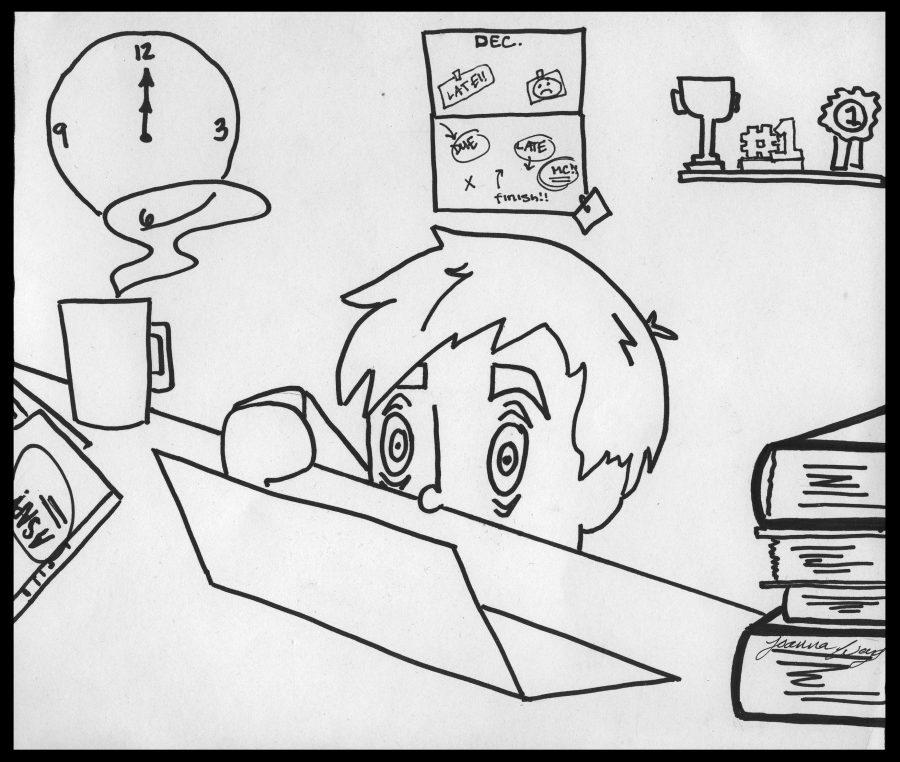Students stress over busy schedules
Every student experiences stress, stress from homework, tests, activities, and even social events. Although some stress can be a motivator, some teenagers don’t notice the buildup until it becomes too much to manage. Just how much stress is too much?
Most teens will say stress is constant. There are moments of relief after a big test or turning in a project, but that relief is quickly overshadowed by the thoughts of more tests and projects. The anxiety build-up has become pretty mainstream among the student population, but that doesn’t mean it’s healthy.
It seems like a lot of students are cycling through a constant schedule of school, homework, extracurricular activities, sleep, and repeat, pushing on towards the weekend where they will have a small break.
Nora Lyang described her very busy fall schedule. “I get home and change for tennis, then I go to tennis, come home, finish homework, and try to work on some college apps,” said the senior earlier in the school year. She reflects that during her sport season, she has barely any free time to relax, and she thinks that adds to her stress.
According to the American Psychological Association, most high schoolers are reporting higher daily levels of stress than adults, and lower levels of sleep. High schoolers are also reporting that they believe they are having much higher stress levels than is healthy for a teenager. In a 2015 national survey of high school students, the APA reported, 68 percent of them said that they frequently experience extreme stress levels during the school year, and 34 percent of them expect their stress to rise in the coming months.
Most students experiencing this stress think it’s pretty normal because so many others are feeling the same way, but it can have some major effects. Mary Tsuboi, Northgate’s school counselor, talked about some serious health issues caused by stress.
“Stress can be healthy, and help us get things accomplished, but when we get too stressed, it leads to depression, anxiety, sleeping and eating disorders,” Tsuboi said. She added that she sees extremely high levels of both anxiety and depression at Northgate, and many students are experiencing both.
In fact, Northgate students aren’t alone. According to a survey done by the National Institute of Mental Health, about 2.8 million American teens are currently suffering from clinical depression and an anxiety disorder.
Tsuboi explained that another huge issue facing students is lack of sleep. “Sleep affects every part of our lives,” she said. “If we don’t sleep enough, we can’t function or learn. If you stay up all night studying, it will be harder to remember the information in the morning.”
When students’ homework loads are bigger, or practices run long – or both, the few invaluable hours of sleep they get are sacrificed further in order to complete their already jam-packed schedule of the week.
Amanda Sabir, a junior, explained her inadequate sleep schedule. “I get four to five hours of sleep per night,” commented Sabir, who has a full schedule of classes and is a member of dance team. She also attends a religion class at her church before her a period leadership class starts. “I wake up early for a six o’clock morning class, and go to bed late because of homework,” she said.
So why are we all so stressed out?
There are so many factors constantly affecting stress. Tsuboi believes the most frequent stressors for high schoolers include “pressure from parents and peers, the high expectations put on high school students, and stress from family or life at home.” There is also the pressure we all put on ourselves to succeed, she explained.
Lyang says that as a senior, one of her biggest stressors is college applications. She doesn’t feel like she has enough time to complete apps, write essays, and finish all the forms she needs. Lyang suggested that teachers help the seniors by assigning essays as homework assignments, or focusing on what to do to write good essays, which some teacher do.
Tsuboi had some great recommendations to help with stress. She suggests that students reevaluate their schedule. “If you’re taking four AP classes, playing a varsity sport, and trying to carry a job all at once, you might need to give something up. If you know a certain class is going to cause you tons of stress, don’t take that class. It’s better to get good grades and have an evenly balanced schedule than to take tons of challenging classes and be constantly overwhelmed.”
Tsuboi also suggests ways parents can help their children with stress. Parents should remember that even though school is important, student health should always come first. If a teen is having a hard time, help them balance their schedule. It might even be a good idea to find someone like a counselor. Make sure kids are eating healthy, getting enough sleep, and are generally pretty happy.
We all experience stress. Some stress we need to drive us to get things accomplished; but when stress builds, we start to feel the effects. It’s very important that we all do what we need to to balance our stress levels, and remain healthy.
For confidential assistance with stress or any other issues, Northgate support counselors are available in room 60 and at (925)-938-3921. Outside of Northgate, assistance is available through the Contra Costa Crisis Center at (800)-833-2900 or at www.crisis-center.org.
